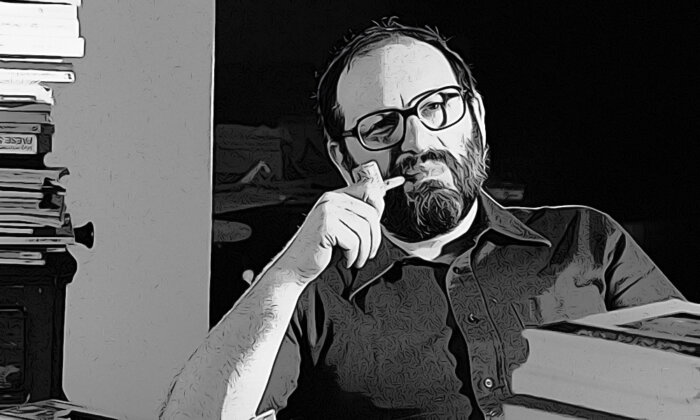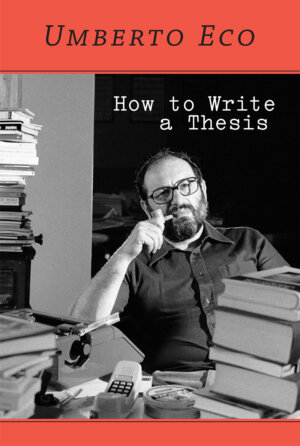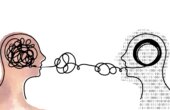How to Write a Thesis, According to Umberto Eco

In 1977, three years before Umberto Eco’s groundbreaking novel “The Name of the Rose” catapulted him to international fame, the illustrious semiotician published a funny and unpretentious guide for his favorite audience: teachers and their students. Now translated into 17 languages (it finally appeared in English in 2015), “How to Write a Thesis” delivers not just practical advice for writing a thesis — from choosing the right topic (monograph or survey? ancient or contemporary?) to note-taking and mastering the final draft — but meaningful lessons that equip writers for a lifetime outside the walls of the classroom. “Your thesis is like your first love” Eco muses. “It will be difficult to forget. In the end, it will represent your first serious and rigorous academic work, and this is no small thing.”
“Full of friendly, no-bullshit, entry-level advice on what to do and how to do it,” praised one critic, “the absolutely superb chapter on how to write is worth triple the price of admission on its own.” An excerpt from that chapter can be read below.
Once we have decided to whom to write (to humanity, not to the advisor), we must decide how to write, and this is quite a difficult question. If there were exhaustive rules, we would all be great writers. I could at least recommend that you rewrite your thesis many times, or that you take on other writing projects before embarking on your thesis, because writing is also a question of training. In any case, I will provide some general suggestions:
You are not Proust. Do not write long sentences. If they come into your head, write them, but then break them down. Do not be afraid to repeat the subject twice, and stay away from too many pronouns and subordinate clauses. Do not write,
The pianist Wittgenstein, brother of the well-known philosopher who wrote the Tractatus Logico-Philosophicusthat today many consider the masterpiece of contemporary philosophy, happened to have Ravel write for him a concerto for the left hand, since he had lost the right one in the war.
Write instead,
The pianist Paul Wittgenstein was the brother of the philosopher Ludwig Wittgenstein. Since Paul was maimed of his right hand, the composer Maurice Ravel wrote a concerto for him that required only the left hand.
Or,
The pianist Paul Wittgenstein was the brother of the famous philosopher, author of the Tractatus. The pianist had lost his right hand in the war. For this reason the composer Maurice Ravel wrote a concerto for him that required only the left hand.
Do not write,
The Irish writer had renounced family, country, and church, and stuck to his plans. It can hardly be said of him that he was a politically committed writer, even if some have mentioned Fabian and “socialist” inclinations with respect to him. When World War II erupted, he tended to deliberately ignore the tragedy that shook Europe, and he was preoccupied solely with the writing of his last work.
Rather write,
Joyce had renounced family, country, and church. He stuck to his plans. We cannot say that Joyce was a “politically committed” writer even if some have gone so far as describing a Fabian and “socialist” Joyce. When World War II erupted, Joyce deliberately ignored the tragedy that shook Europe. His sole preoccupation was the writing of Finnegans Wake.
Even if it seems “literary,” please do not write,
When Stockhausen speaks of “clusters,” he does not have in mind Schoenberg’s series, or Webern’s series. If confronted, the German musician would not accept the requirement to avoid repeating any of the twelve notes before the series has ended. The notion of the cluster itself is structurally more unconventional than that of the series. On the other hand Webern followed the strict principles of the author of A Survivor from Warsaw. Now, the author of Mantra goes well beyond. And as for the former, it is necessary to distinguish between the various phases of his oeuvre. Berio agrees: it is not possible to consider this author as a dogmatic serialist.
You will notice that, at some point, you can no longer tell who is who. In addition, defining an author through one of his works is logically incorrect. It is true that lesser critics refer to Alessandro Manzoni simply as “the author of the Betrothed,” perhaps for fear of repeating his name too many times. (This is something manuals on formal writing apparently advise against.) But the author of The Betrothed is not the biographical character Manzoni in his totality. In fact, in a certain context we could say that there is a notable difference between the author of The Betrothed and the author of Adelchi, even if they are one and the same biographically speaking and according to their birth certificate. For this reason, I would rewrite the above passage as follows:
When Stockhausen speaks of a “cluster,” he does not have in mind either the series of Schoenberg or that of Webern. If confronted, Stockhausen would not accept the requirement to avoid repeating any of the twelve notes before the end of the series. The notion of the cluster itself is structurally more unconventional than that of the series. Webern, by contrast, followed the strict principles of Schoenberg, but Stockhausen goes well beyond. And even for Webern, it is necessary to distinguish among the various phases of his oeuvre. Berio also asserts that it is not possible to think of Webern as a dogmatic serialist.

You are not e. e. cummings. Cummings was an American avant-garde poet who is known for having signed his name with lower-case initials. Naturally he used commas and periods with great thriftiness, he broke his lines into small pieces, and in short he did all the things that an avant-garde poet can and should do. But you are not an avant-garde poet. Not even if your thesis is on avant-garde poetry. If you write a thesis on Caravaggio, are you then a painter? And if you write a thesis on the style of the futurists, please do not write as a futurist writes. This is important advice because nowadays many tend to write “alternative” theses, in which the rules of critical discourse are not respected. But the language of the thesis is a metalanguage, that is, a language that speaks of other languages. A psychiatrist who describes the mentally ill does not express himself in the manner of his patients. I am not saying that it is wrong to express oneself in the manner of the so-called mentally ill. In fact, you could reasonably argue that they are the only ones who express themselves the way one should. But here you have two choices: either you do not write a thesis, and you manifest your desire to break with tradition by refusing to earn your degree, perhaps learning to play the guitar instead; or you write your thesis, but then you must explain to everyone why the language of the mentally ill is not a “crazy” language, and to do it you must use a metalanguage intelligible to all. The pseudo-poet who writes his thesis in poetry is a pitiful writer (and probably a bad poet). From Dante to Eliot and from Eliot to Sanguineti, when avant-garde poets wanted to talk about their poetry, they wrote in clear prose. And when Marx wanted to talk about workers, he did not write as a worker of his time, but as a philosopher. Then, when he wrote The Communist Manifesto with Engels in 1848, he used a fragmented journalistic style that was provocative and quite effective. Yet again, The Communist Manifesto is not written in the style of Capital, a text addressed to economists and politicians. Do not pretend to be Dante by saying that the poetic fury “dictates deep within,” and that you cannot surrender to the flat and pedestrian metalanguage of literary criticism. Are you a poet? Then do not pursue a university degree. Twentieth-century Italian poet Eugenio Montale does not have a degree, and he is a great poet nonetheless. His contemporary Carlo Emilio Gadda (who held a degree in engineering) wrote fiction in a unique style, full of dialects and stylistic idiosyncrasies; but when he wrote a manual for radio news writers, he wrote a clever, sharp, and lucid “recipe book” full of clear and accessible prose. And when Montale writes a critical article, he writes so that all can understand him, including those who do not understand his poems.
Begin new paragraphs often. Do so when logically necessary, and when the pace of the text requires it, but the more you do it, the better.
Write everything that comes into your head, but only in the first draft. You may notice that you get carried away with your inspiration, and you lose track of the center of your topic. In this case, you can remove the parenthetical sentences and the digressions, or you can put each in a note or an appendix. Your thesis exists to prove the hypothesis that you devised at the outset, not to show the breadth of your knowledge.
Use the advisor as a guinea pig. You must ensure that the advisor reads the first chapters (and eventually, all the chapters) far in advance of the deadline. His reactions may be useful to you. If the advisor is busy (or lazy), ask a friend. Ask if he understands what you are writing. Do not play the solitary genius.
Do not insist on beginning with the first chapter. Perhaps you have more documentation on chapter 4. Start there, with the nonchalance of someone who has already worked out the previous chapters. You will gain confidence. Naturally your working table of contents will anchor you, and will serve as a hypothesis that guides you.
Do not use ellipsis and exclamation points, and do not explain ironies. It is possible to use language that is referential or language that is figurative. By referential language, I mean a language that is recognized by all, in which all things are called by their most common name, and that does not lend itself to misunderstandings. “The Venice-Milan train” indicates in a referential way the same object that “The Arrow of the Lagoon” indicates figuratively. This example illustrates that “everyday” communication is possible with partially figurative language. Ideally, a critical essay or a scholarly text should be written referentially (with all terms well defined and univocal), but it can also be useful to use metaphor, irony, or litotes. Here is a referential text, followed by its transcription in figurative terms that are at least tolerable:
[Referential version:] Krasnapolsky is not a very sharp critic of Danieli’s work. His interpretation draws meaning from the author’s text that the author probably did not intend. Consider the line, “in the evening gazing at the clouds.” Ritz interprets this as a normal geographical annotation, whereas Krasnapolsky sees a symbolic expression that alludes to poetic activity. One should not trust Ritz’s critical acumen, and one should also distrust Krasnapolsky. Hilton observes that, “if Ritz’s writing seems like a tourist brochure, Krasnapolsky’s criticism reads like a Lenten sermon.” And he adds, “Truly, two perfect critics.”
[Figurative version:] We are not convinced that Krasnapolsky is the sharpest critic of Danieli’s work. In reading his author, Krasnapolsky gives the impression that he is putting words into Danieli’s mouth. Consider the line, “in the evening gazing at the clouds.” Ritz interprets it as a normal geographical annotation, whereas Krasnapolsky plays the symbolism card and sees an allusion to poetic activity. Ritz is not a prodigy of critical insight, but Krasnapolsky should also be handled with care. As Hilton observes, “if Ritz’s writing seems like a tourist brochure, Krasnapolsky’s criticism reads like a Lenten sermon. Truly, two perfect critics.”
You can see that the figurative version uses various rhetorical devices. First of all, the litotes: saying that you are not convinced that someone is a sharp critic means that you are convinced that he is not a sharp critic. Also, the statement “Ritz is not a prodigy of critical insight” means that he is a modest critic. Then there are the metaphors: putting words into someone’s mouth, and playing the symbolism card. The tourist brochure and the Lenten sermon are two similes, while the observation that the two authors are perfect critics is an example of irony: saying one thing to signify its opposite.
Now, we either use rhetorical figures effectively, or we do not use them at all. If we use them it is because we presume our reader is capable of catching them, and because we believe that we will appear more incisive and convincing. In this case, we should not be ashamed of them, and we should not explain them. If we think that our reader is an idiot, we should not use rhetorical figures, but if we use them and feel the need to explain them, we are essentially calling the reader an idiot. In turn, he will take revenge by calling the author an idiot. Here is how a timid writer might intervene to neutralize and excuse the rhetorical figures he uses:
[Figurative version with reservations:] We are not convinced that Krasnapolsky is the “sharpest” critic of Danieli’s work. In reading his author, Krasnapolsky gives the impression that he is “putting words into Danieli’s mouth.” Consider Danieli’s line, “in the evening gazing at the clouds.” Ritz interprets this as a normal geographical annotation, whereas Krasnapolsky “plays the symbolism card” and sees an allusion to poetic activity. Ritz is not a “prodigy of critical insight,” but Krasnapolsky should also be “handled with care”! As Hilton ironically observes, “if Ritz’s writing seems like a vacation brochure, Krasnapolsky’s criticism reads like a Lenten sermon.” And he defines them (again with irony!) as two models of critical perfection. But all joking aside …
I am convinced that nobody could be so intellectually petit bourgeois as to conceive a passage so studded with shyness and apologetic little smiles. Of course I exaggerated in this example, and here I say that I exaggerated because it is didactically important that the parody be understood as such. In fact, many bad habits of the amateur writer are condensed into this third example. First of all, the use of quotation marks to warn the reader, “Pay attention because I am about to say something big!” Puerile. Quotation marks are generally only used to designate a direct quotation or the title of an essay or short work; to indicate that a term is jargon or slang; or that a term is being discussed in the text as a word, rather than used functionally within the sentence. Secondly, the use of the exclamation point to emphasize a statement. This is not appropriate in a critical essay. If you check the book you are reading, you will notice that I have used the exclamation mark only once or twice. It is allowed once or twice, if the purpose is to make the reader jump in his seat and call his attention to a vehement statement like, “Pay attention, never make this mistake!” But it is a good rule to speak softly. The effect will be stronger if you simply say important things. Finally, the author of the third passage draws attention to the ironies, and apologizes for using them (even if they are someone else’s). Surely, if you think that Hilton’s irony is too subtle, you can write, “Hilton states with subtle irony that we are in the presence of two perfect critics.” But the irony must be really subtle to merit such a statement. In the quoted text, after Hilton has mentioned the vacation brochure and the Lenten sermon, the irony was already evident and needed no further explanation. The same applies to the statement, “But all joking aside.” Sometimes a statement like this can be useful to abruptly change the tone of the argument, but only if you were really joking before. In this case, the author was not joking. He was attempting to use irony and metaphor, but these are serious rhetorical devices and not jokes.
You may observe that, more than once in this book, I have expressed a paradox and then warned that it was a paradox. For example, in section 2.6.1, I proposed the existence of the mythical centaur for the purpose of explaining the concept of scientific research. But I warned you of this paradox not because I thought you would have believed this proposition. On the contrary, I warned you because I was afraid that you would have doubted too much, and hence dismissed the paradox. Therefore I insisted that, despite its paradoxical form, my statement contained an important truth: that research must clearly define its object so that others can identify it, even if this object is mythical. And I made this absolutely clear because this is a didactic book in which I care more that everyone understands what I want to say than about a beautiful literary style. Had I been writing an essay, I would have pronounced the paradox without denouncing it later.
Always define a term when you introduce it for the first time. If you do not know the definition of a term, avoid using it. If it is one of the principal terms of your thesis and you are not able to define it, call it quits. You have chosen the wrong thesis (or, if you were planning to pursue further research, the wrong career).
Umberto Eco was an Italian novelist, literary critic, philosopher, semiotician, and university professor. This article is excerpted from his book “How to Write a Thesis.”



